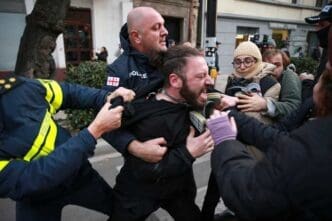In a decisive early morning operation, police in Tbilisi, Georgia’s capital, dismantled a protest camp on a central street. Demonstrators had been rallying continuously, contesting last month’s parliamentary election results by citing alleged vote-rigging.
The recent parliamentary elections in Georgia have sparked significant unrest, with the results keeping the Georgian Dream party in power. Opponents have claimed the vote was manipulated and staged protests throughout Tbilisi demanding a new election.
Demonstrators, determined to stay until their demands were met, established a tent camp in a symbolic act of defiance. However, these actions were met with force as police moved in to dismantle the camp, leading to scuffles and the detainment of several protesters. Some protestors waved European Union flags, underscoring their desire for closer ties with the European bloc.
President Salome Zourabichvili has openly rejected the election outcomes, announcing plans to challenge the results in the Constitutional Court. Her argument is based on the alleged violation of constitutional principles regarding the secrecy and universality of the vote. Zourabichvili, though largely a ceremonial figure in governance, has accused external pressures, particularly from Moscow, of influencing Georgia’s EU accession aspirations.
The opposition has criticized the Georgian Dream party, founded by billionaire Bidzina Ivanishvili, for its perceived authoritarian leanings and pro-Moscow policies. Recently, the party introduced legislation reminiscent of Russian laws used to suppress free speech and LGBTQ+ rights.
Protests intensified after the EU halted Georgia’s membership application process. This decision followed the passage of a law mandating organizations receiving substantial foreign funding to register as foreign agents, a move seen as silencing government critics.
Nika Melia, a leading opposition voice, expressed hope that the ongoing protests would initiate a broader movement against Ivanishvili’s perceived autocratic regime. Meanwhile, European election monitors have reported instances of bribery, double voting, and violence during the electoral process, further exacerbating the political divide.
The political climate in Georgia remains tense, with protests highlighting deep-seated concerns over electoral integrity and governance. The response from authorities, juxtaposed with public dissent and European scrutiny, marks a critical moment in Georgia’s political landscape.
Source: News4jax








